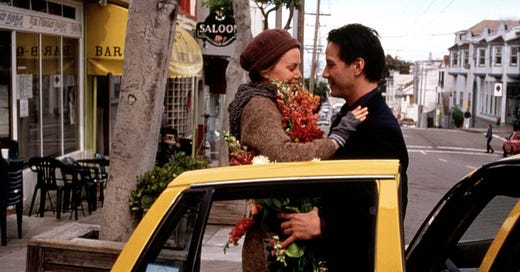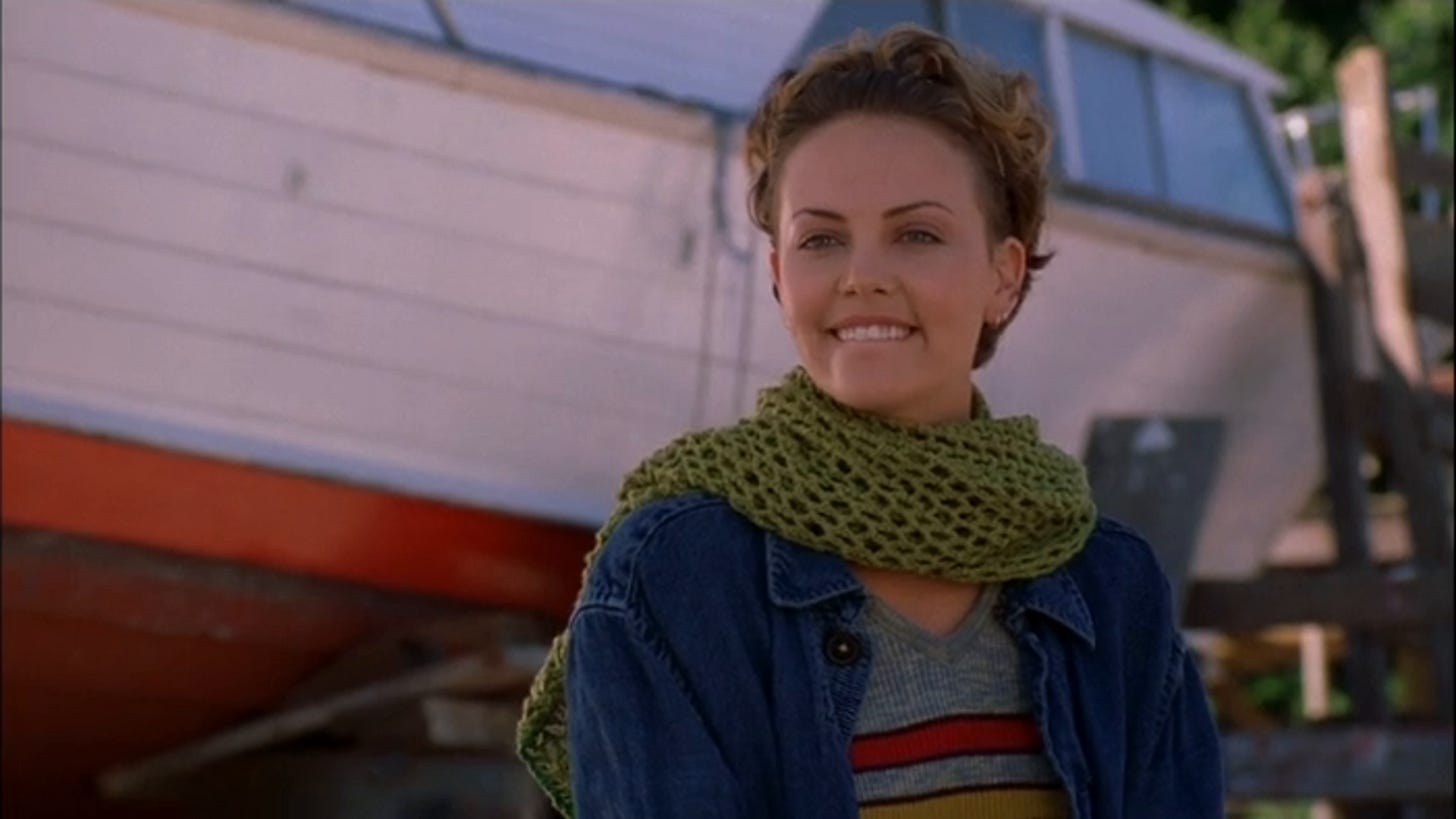(Cinema for the Infirm is a feature in which I, a person with a potentially life-threatening illness, discuss films that feature a seriously ill character, for better or worse [mostly worse]. Spoilers should be expected.)
It’s been well established at this point that my good buddy1 Nathan Rabin coined the term “manic pixie dream girl,” even if it’s taken on a life of its own. But do you know what movie he was writing about when he came up with it? I won’t make you work for it, it was 2005’s Elizabethtown, a movie I’m not sure anyone remembers except for its tenuous connection to the pop culture zeitgeist.
No one would argue that Kirsten Dunst’s aggressively perky flight attendant in Elizabethtown is unworthy of the manic pixie dream girl title. However, I posit that the platonic ideal of the MPDG actually appeared four years earlier in Sweet November, a romantic comedy-drama for emotionally disturbed people. I don’t mean in a cool, edgy way, like Sid & Nancy, I mean you’d have to be emotionally disturbed to think anything that happens in it makes sense, let alone is romantic.
Keanu Reeves is Nelson Moss, a San Francisco advertising executive who’s such a workaholic that as soon as he’s done having morning sex with his gorgeous girlfriend he rolls off of her to take a business call, and watches ten televisions at the same time. He may also have what appears to be undiagnosed depression and obsessive-compulsive disorder, but the movie doesn’t have the temerity to elaborate on that, because otherwise that would suggest he needs something more than the love of a good woman to straighten his life out.
But I’m jumping ahead. Nelson is too busy trying to sell hot dogs to have time for such frivolities as meeting his girlfriend’s parents for dinner, or get his driver’s license renewed. That ends up working out in his favor, because he has a meet cute at the DMV with Sara Deever, played by Charlize Theron, in her second screen pairing with Reeves after 1997’s The Devil’s Advocate, a movie in which the antagonist is Satan himself, and yet the stench of evil is far more pervasive here.
Sara nearly spills her groceries into Nelson’s lap, and he in turn mistakenly gets her in trouble for cheating on her written driver’s license test, sitting there and saying nothing while she loses her license for 30 days. Rather than key his car and leave like a normal person would, Sara uses this as an opportunity to begin what’s basically a stalking campaign against Nelson. But it’s a quirky stalking campaign, you see, where she forces him to drive her around while she does wacky things like break into people’s houses and commit dognapping.
Though he has all the warmth and charm of an ice sculpture brought to hideous human life, Sara sees the potential for…something in Nelson, and makes him an extremely unlikely proposal: move in with her for 30 days, so that she can improve his life. “I have a gift for helping men with their problems,” she tells him, and makes them the entire focus of her life, but for only a month before she sends them on their way, no strings attached. The only thing she gets out of it is the joy of giving.
I’ll give the hetero male readers in my audience a moment to, uh, compose themselves.
ANYWAY, while Nelson rightly declines at first, luckily he’s both fired and dumped by his girlfriend (on the same day!), clearing up his calendar so that he can give in to Sara’s absolutely insane suggestion.
We all love an “opposites attract” love story, and no two people in the history of film have been less suited for each other than Sara, the kind of girl who dresses like an adorable bag lady, turns cartwheels, lives in an apartment that looks like a junk shop, and uses a television for a planter2, and Nelson, a gigantic, humorless prick. Sara’s idea of “helping” Nelson is mostly just dragging him around her colorful neighborhood full of friendly weirdos that Nelson treats with barely concealed distaste, but none so much as for her neighbor and best friend Chaz (Jason Isaacs), who’s gay. She also foists a kid onto him, lonely, fatherless Abner (Liam Aiken), and all but demands that Nelson act as a father figure to him, even though they’ve just met.
Every day is a new adventure with the (frankly exhausting) Sara, as they go to a dog park, slow dance, play endless games of hide-and-seek, take bubble baths together (if you guessed that she has one of those old-fashioned clawfoot tubs, give yourself a cigar), and have dinner with drag queens. Though he looks like he has indigestion, Nelson is really having the time of his life, as Sara acts as lover, friend, mother, and therapist for him, all while steadfastly refusing to talk about or want anything for herself.
After two (2) weeks of spending every waking minute with Sara, who treats their relationship with the gusto of a puppy with a rubber bone, Nelson has given up any desire to continue pursuing his career (and presumably no longer needs such meaningless things as money), and is attending father-son school events with Abner. He decides to propose to Sara, even though he doesn’t know a single thing about her other than she treats men as self-improvement projects while asking for nothing in return.
Alas, the course of true love never did run smooth, especially when the leading lady of a grossly manipulative melodrama has been hiding the fact that she’s dying of cancer the whole time.
The minute it becomes apparent that something is wrong with Sara, she starts looking a bit pale, and dons cute little knit cancer hats and schmattes, though she never actually loses any of her hair. But that’s the extent we see of it, as other than needing to be carried by Chaz in one scene, she looks great and has a tremendous amount of energy. Both Sara, and the script, treat her illness as if it’s something to be ashamed of, as she hides her life-saving medications in a secret locked cabinet like it’s street heroin. She only wants Nelson to experience the turning cartwheels and bubble baths part of a relationship, and not the grown-up, real life, “sometimes life is hard and you have to help each other” part.
After Nelson plies her with gifts and romantic gestures proving his love for her, does Sara give in and let him take care of her in her dying days, as any husband should? Absolutely not! Insisting that he remember her as a screenwriter’s fantasy and not as a human being unfortunately stricken with an illness millions of people suffer from, she abandons him so that she can go home to her family to die, thus sparing Nelson (and the audience) from any further unpleasantness. I’m not kidding: she kisses him goodbye, blindfolds him, and then wanders away, suggesting that she’s going directly to the airport in her nightgown.
All you really need to know about Sweet November is that it’s a movie that’s so unsure of how any of this is going to land with the audience that Enya’s “Only Time” is played not once, but twice. Thank god for that, otherwise I would have thought it was a psychological thriller rather than a relentlessly schmaltzy rom-com. Beyond the ludicrous (if not downright sinister) plot, there was not a single thing about this movie that I accepted as anything resembling actual life on Earth. I didn’t buy that Nelson’s entire career hinged on creating a single campaign to sell hot dogs, nor the twist that Chaz is a rival advertising executive, a reveal that comes to nothing. I refused to accept that Sara, a professional dog groomer (though she’s never actually shown grooming a dog), makes a habit of stealing her clients’ dogs, something you’d think she’d only be able to get away with once. I was skeptical that everyone in Nelson’s life before Sara were soulless, money-hungry assholes, while everyone after might as well be in a touring company of Rent. I didn't even buy that this takes place in San Francisco, and not some A.I.-generated shadow universe.
But what I bought least of all was Nelson and Sara’s relationship, which is a big problem considering that’s the core of the plot. It’s not just that Reeves and Theron have an astonishing lack of chemistry, or that Reeves looks embarrassed and uncomfortable, like he was cast in the film after losing a bet. It’s that Sara’s selfless habit of teaching sad sacks and jerks how to embrace life while she expects nothing in return for her efforts is spiritually repugnant. I wish screenwriter Kurt Voelker a hemorrhoid for every time Nelson insults Sara when they first get together, and she just takes it, because she’s that determined to turn his frown upside down.
Voelker’s screenplay is so uninterested in Sara as a character that it doesn’t even go into why or for how long she’s been doing this. The best that can be gleaned from the puerile dialogue is that she only wants to experience the puppy love part of a relationship, before a couple begins to see each other’s faults, and be perceived by every man she’s ever dated as a being of pure goodness and light. Seems reasonable, right? Evidently a being of pure goodness and light doesn’t ever get sick or need help, so she leaves that part to Chaz, who has his own life and really shouldn’t be stuck with the role of Sara’s surrogate husband, but I suppose somebody thinks this is all very romantic.
Perhaps one of the most emotionally fraught aspects of having a serious illness (even one that isn’t terminal) is the fear of being a burden on the ones we love, especially if and when things go downhill and they may be forced into a caregiver role. No one wants to be dependent on a romantic partner in that regard, and it creates a tremendous amount of insecurity and guilt. Sweet November grossly plays right into that fear, suggesting that the most heroic thing a sick person can do is keep that part of their life separate from their partner, while maintaining an image of sunny perfection, because God forbid they see that life can be unfair sometimes. Public shaming should be brought back specifically for everyone involved in the making of it.
Really, ask him!
She also mentions several times that she’s vegan, which back in 2001 was a code word for “weirdo.”






A film where a dying woman has a series of no strings attached relationships might be interesting if done well but making her their mommy too is gross.
I found this substack through Nathan.